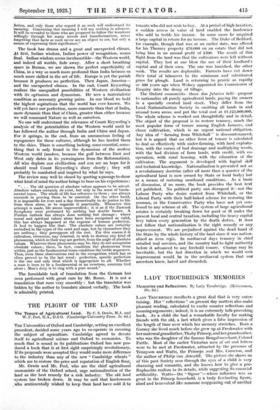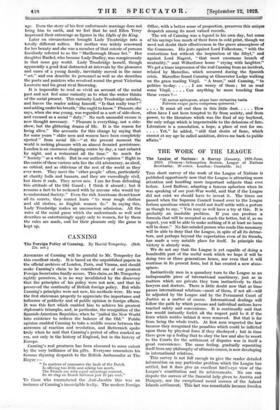LADY TROUBRIDGE'S MEMORIES
LADY TROLTDRIDGE recollects a great deal that is very enter- taining. Her " reflections " on present day matters also make pleasant reading, calculated to excite counter reflections and amusing arguments ; indeed, it is an extremely talk-provoking book. As a child she had a remarkable faculty for making friends with the old, a fact which gives a false impression of the length of time over which her memory stretches. Born a Gurney she lived much before she grew up at Freshwater with her maternal grandfather, Thoby Prinsep, and her grandmother, who was the daughter of the famous Bengal merchant, Colonel Pattle. Most of the earlier Victorian men of art and letters were to be met at Freshwater, attracted by the presence of Tennyson and Watts, the Prinseps and Mrs. Cameron, and the author of Philip can Arteoeldt. The picture she shows us of this past Society seen through the eyes of a child is very charming and romantic, and she knows how to give a pre. Raphaelite realism to its details, while suggesting its essential artificiality. Watts—the "Signor "—whose influence was so great in the Prinsep household, is a truly fascinating figure, aloof and benevolent like someone reappearing out of another
age. Even the story of his first unfortunate marriage does not bring him to earth, and we feel that he and Ellen Terry impressed their entourage as figures in the Idylls of the King.
Later on circumstances brought Lady Troubridge into a totally different milieu. Her mother was widely renowned for her beauty and she was a member of that coterie of persons familiarly referred to as the "Marlborough House Set." Her daughter Rachel, who became Lady Dudley, was conspicuously in that same gay world. Lady Troubridge herself, though apparently a good deal distracted at intervals by the pleasures and cares of a young family, inevitably moved in the same " set," and can describe its personnel as well as she describes the poets and painters who revolved round the great Victorian Laureate and his great rival Browning.
It is impossible to read so vivid an account of the social past and not feel some curiosity as to what the writer thinks of the social present. This curiosity Lady Troubridge satisfies, and leaves the reader asking himself, " Is that really true ? " and adding under his breath," She ought to know." Pleasure, she Says, when she was young, was regarded as a sort of side-show, and excused as a social " duty." No such uncandid excuse is now thought necessary. " Pleasure is everything, not a side- show, but the glittering drama of life. It is the reason for being alive." She accounts for this change by saying that for some years " older men and women have been completely ejected " from social life—" at the present moment the world is seeking pleasure with an almost frenzied persistence. London is an enormous shopping centre by day, a vast cabaret by night, and a restaurant all the time." So much for " Society " as a whole. But in our author's opinion " Right in the centre of these various sets lies the old aristocracy, as aloof, as critical, and as oblivious of the rest of the world as they ever were. They meet the ' other people ' often, particularly at charity balls and bazaars, and they are exceedingly civil, but there it ends. They never mix. I am far from defending this attitude of the Old Guard ; I think it absurd ; but it remains a fact to be reckoned with by anyone who would try to understand Society." Even the rich Americans do not know all its secrets, they cannot learn " to wear rough clothes and old clothes, as English women do." In saying this, Lady Troubridge makes an unconscious admission. All the rules of the social game which she understands so well and describes so entertainingly apply only to women, for by them the rules are made, and for their pleasure only the game is kept up.











































 Previous page
Previous page